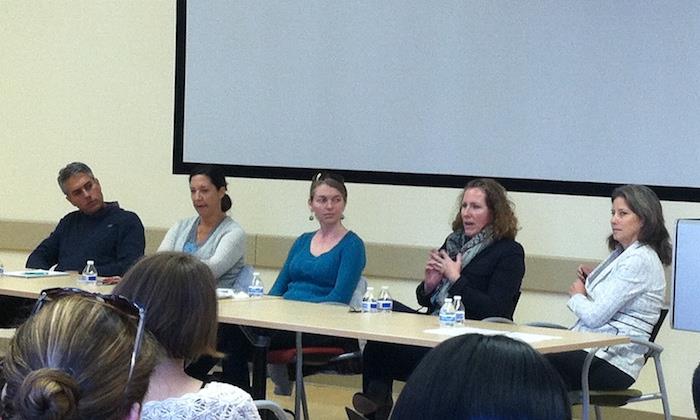Career & Tools
Five panelists discussed how they made careers in administrative positions after earning a Ph.D., how to advance one's career, and how to apply your grad school skills in an administration post.
Did you know that the university offers many rewarding career opportunities for Ph.D.s in addition to faculty positions? On Tuesday, Dec. 1, five panelists discussed how they made careers in administrative positions after earning a Ph.D., how to advance one's career, and how to apply your graduate school skills in an administration position.
Panel
- Brandt Burgess (Ph.D., Biochemistry), Research Integrity Director at the Office of Research
- Rose Elfman (Ph.D., Theater), Managing Editor for Publications at the Center for Black Studies Research
- Julie Standish (Ph.D., Ecology, Evolution, and Marine Biology), Interim Research Intern Coordinator at the Materials Research Laboratory
- Barbara Walker (Ph.D., Geography), Director of Research Development for Social Sciences, Humanities, and Fine Arts at the Office of Research
- Meredith Murr (Ph.D., Molecular Biology/Biochemistry) (moderator), Director of Research Development at the Office of Research
 How did you get into your field?
How did you get into your field?
Common themes: Most of the panelists agreed that their admin position was an unplanned career choice, the result of simply following their interests in different ways after grad school. They didn't necessarily set out with a master plan, but instead identified their broader career interests and networked in order to find opportunities. The panelists also noted that their job choices were often influenced by factors such as geographical limitations (had to get a job in the area), family life requirements (spouse and/or children who could not move), dissatisfaction with their chosen field, or no job opportunities in their chosen field.
Julie mentored graduates and undergraduates as a Ph.D. student, then found a 50% time at Cal Lutheran teaching in her field. She then applied for and was offered a 50% admin position at UCSB.
Rose worked as a TA in Black Studies and was an editor for their journal. After being on the academic job market for a year, she found her current job at the Center for Black Studies Research listed on Craigslist. The minimum requirements were only for a B.A., but she showed how her graduate school experience made her the ideal candidate for the position. She started part-time and then went to full time after she graduated with her Ph.D.
Barbara came to UCSB as a postdoc in Geography and was very successful in writing her own research grants. The Office of Research recruited her to help other researchers write grants, and the prospect of a job based in Santa Barbara worked well with Barbara's family commitments.
Brandt knew that he didn't want to work in a research lab or in industry, and he went to an event for alternative careers in science and decided he wanted to get involved in science policy. During a postdoc at UCSB, he moved into policy administration by setting up a laboratory, and after a few years of experience outside UCSB, he was hired back here by the Office of Research.
What are the pros and cons of admin positions?
Common Themes: Panelists seemed to agree these jobs offered them a better and more enjoyable work life; however, it was less secure than the one provided by a tenured position.
Pros
- Able to have a better work/life balance than afforded by lab work.
- Unlike research, the work is done when you go home. You can have fun.
- There is more flexibility for work schedules.
- Unlike being a solo researcher, you have more colleagues and collaboration available.
Cons
- Not having tenure.
- Unsure of how to advance career. There is no defined career track path built into the job.
- Sometimes wonder if you made the right choice.
- Miss doing research or having a current project to work on.
How do you advance at an admin job?
The panelists stated that there is a ceiling to how high you can go, depending on the university. The top tier positions, such as assistant or associate chancellor, are reserved for faculty. However, undergraduate schools and non-top tier schools typically offer more flexibility for advancement. The panelists also mentioned that you can make lateral moves, change to other positions at a university, or look into the private sector or non-profits.
What are the skills necessary for an admin job?
The panelists agreed that the Ph.D. was good for many jobs. You have exactly the kind of skills that employers want. You can write, present, and think. You are detail-oriented and serious. In fact, more than half the panelists applied to jobs that did not require Ph.D.s but made a case for why their advanced skill set was an asset. They stressed that you need to spell out the skills you have to potential employers. For example, you can talk about your leadership or your work in a project organization.
Lana Smith-Hale contributed to this article.